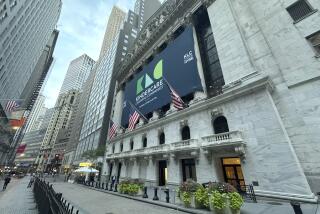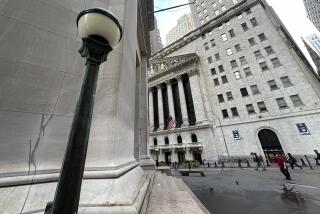Stocks in Hong Kong Are at Record Levels : Investment: Company profits are up, and China, which takes over the colony in 1997, has created optimism by continuing to reform its economy.
- Share via
HONG KONG — Healthy profits reported by Hong Kong companies and growing confidence by international investors that development in southern China will continue to fuel economic growth in this British colony have boosted the stock market to record highs in recent months.
Although the Hang Seng index fell slightly Friday to 5,015 because of concerns about a proposed $3.8-billion buyout of Britain’s Midland Bank by the parent of Hong Kong and Shanghai Banking Corp., it reached a high of 5,071 the previous week, a 17% rise from the beginning of the year.
“I don’t think we have a runaway bull market,” said Gilbert Chu, director of Prudential Asia Fund Management Ltd. “It is a good market where we see a lot more participants putting money in. I think foreigners have been very positive about Hong Kong for some time.”
The confidence of foreigners--Europeans and Americans who have poured capital into the market--has been renewed by signs that China intends to press ahead with economic reforms. Beijing has promised that Hong Kong can retain its capitalist system and free society for 50 years after it takes control in 1997, but confidence in China’s intentions sagged sharply after the brutal June 4, 1989, crackdown on pro-democracy protests in Beijing.
“(China’s 87-year-old senior leader) Deng Xiaoping has said all the right things over the last three or four months,” said David Lavington, director of sales at Morgan Granfell Asia Securities (HK) Ltd. “The political worries in Hong Kong after June, 1989, seem to have evaporated. . Suddenly, people have realized that China is reforming and is a booming economy, which is certainly having a very big effect on the economy of Hong Kong.”
Hong Kong’s prosperity is closely linked to strong growth in China’s adjacent Guangdong province, where many Hong Kong firms have joint ventures. Investors were encouraged by Deng’s January visit to Shenzhen and Guangdong.
“He has had a very strong campaign over the last three to four weeks promoting very strongly further economic reforms in China,” said Howard Gorges, managing director of South China Brokerage Co.
Alex Tang, research manager at Dao Heng Securities, said the news coming out of China shows that “the Chinese are not going to give up what they have gained.”
Southern China is a booming economy, “and that is having a very positive effect on the companies listed in Hong Kong,” Lavington said.
Tang said the Hong Kong market has also been helped by signs of an economic recovery in the United States. “Quite a number of local firms also depend on the U.S. market. So it serves as a boost as well,” he said.
Indications that the United States would continue “most-favored nation” trade status for China have also helped boost Hong Kong stocks, Tang added.
The U.S. Senate failed last week to override President Bush’s veto of a bill that would have attached human rights and other conditions to continuance of MFN status for China.
Moreover, Tang said, Hong Kong has intrinsic strengths to support a rising market.
“We have full employment here,” he noted. “The unemployment rate is about 2%. It is an envy of the world. Another thing is that we have such a low-tax system here. The corporate rate . . . (is) 17.5%. The tourist arrival figures are still creeping up. And then the property market--because of those favorable factors--it has sustained upward momentum during the last half year.”
The market was off slightly last week because of a 9% drop in Hong Kong Bank’s stock after the announcement of the Midland buyout offer.
The move to acquire Midland, which would create one of the world’s largest banks, is generally viewed by analysts as a reasonable attempt by the Hong Kong Bank to diversify its interests and provide greater protection against possible change in Hong Kong after Beijing takes over.
But, said Lavington, “there is a lot of uncertainty about the deal at the moment, until analysts know exactly the price that Hong Kong Bank is going to pay for Midland Bank and how they’re going to pay for it.”
Barton Biggs, worldwide chief of research for Morgan Stanley & Co., predicts that the Hong Kong market will continue to be a “spectacular performer.”
In a report after a recent visit to Hong Kong, he noted expected earnings growth among Hong Kong companies over the next year, among other factors.
“Is everything perfect in Hong Kong? Of course not,” Biggs said. “The market is up a lot, speculation in residential real estate is wild, inflation is in the double digits and the peg with the dollar is a problem. Also, the old men in China (who rule the country) could change their minds.
“Nevertheless, with the lust for emerging markets at fever pitch, Hong Kong’s stock exchange could continue to be a spectacular performer. One only has to observe the immense percentage gains posted by the South American and Mexican stock markets to imagine what still could happen to Hong Kong.”
Times staff writer Holley reported from Beijing and special correspondent Courtney from Hong Kong.
More to Read
Inside the business of entertainment
The Wide Shot brings you news, analysis and insights on everything from streaming wars to production — and what it all means for the future.
You may occasionally receive promotional content from the Los Angeles Times.










